
Tempus fugit - When time means something for a sitcom
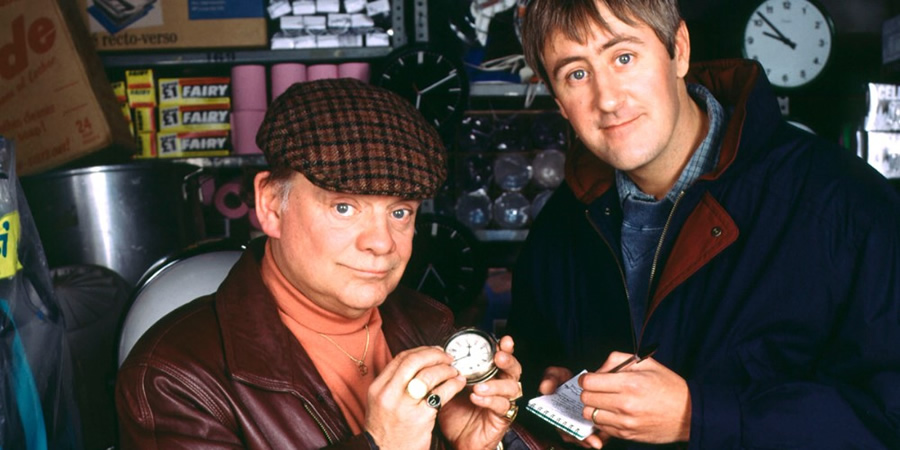
This time of year, as the final few chimes to midnight creep ever closer, makes clock watchers of us all. It is quite an opportune occasion, therefore, for us to pay more attention to the role that clocks, and time itself, can play in some of our sitcoms, because they have contributed some notable comic moments.
It is actually rare for the nature of, or the means of measuring, the passage of time to feature much in this format, because time, in a sitcom, is traditionally cyclical. Rather than flowing remorselessly forward, like in life, in a sitcom it tends to make it to the half hour mark but then shoots straight back to zero.
Time in most episodes of, say, Hancock or Steptoe And Son, Fawlty Towers or Father Ted, is as tightly trapped as the characters - limited to thirty minutes, like the characters are limited to their location, for as long as the programme persists. Because, in conventional cases, sitcom characters do no really age, or grow, or escape, so neither does time really fly so much as spin round and round in its wing-clipped way as it struggles on from week to week.
Take Dad's Army. There are plenty of clocks in Dad's Army: there is a stop watch in The Showing Up Of Corporal Jones (1968) when the completion of an assault course is timed; there is an almost palpable sense of the seconds slowly passing in Something Nasty In The Vault when Mainwaring and Wilson, stuck together in the bowels of their bank with an unexploded bomb on their laps, wait patiently for someone to defuse it before it blows them up; an enemy pilot, and then Jones, end up dangling precariously from the town hall clock in Time On My Hands (1972); and Mainwaring and many of his men try to disguise the signs of their age in Keep Young And Beautiful (1972).
In a more meaningful sense, however, none of the hands on the clocks in Walmington-on-Sea carry the seconds, minutes and hours with them in their motion. The platoon is stuck permanently in the middle of the Second World War, as confined by time as they are by the conflict.
That is the typical lot of a sitcom. The clocks get cleaned every episode and the tracks are dusted over. You can often see them and you can sometimes hear them but the chimes belie the absence of change. Life does not so much go on as around, with time more of a background reality effect than an animated element of the situation.
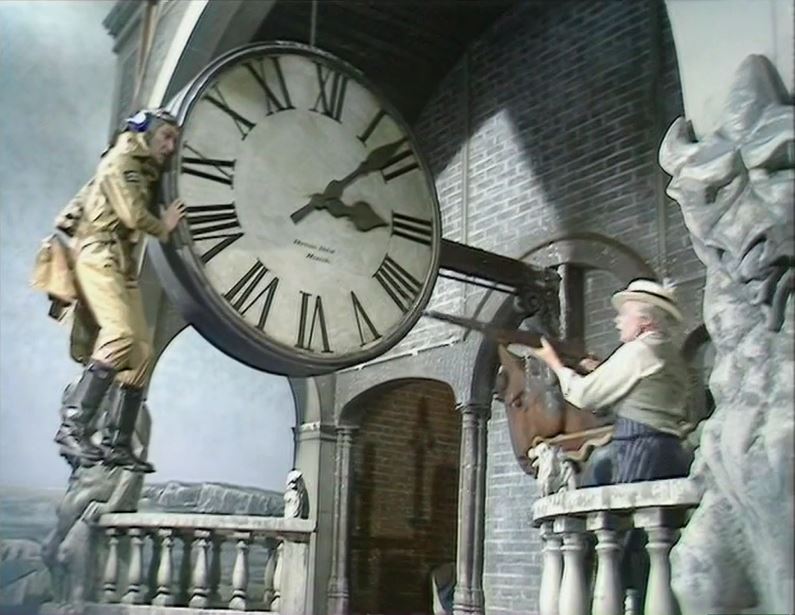
This makes it all the more intriguing on those rare occasions when, in certain episodes, the clock comes alive, the minutes suddenly start to really matter, and the tick-tock of time becomes an integral part of the storyline. These are the episodes that drive along with a rare and special sense of urgency and significance as the usual formula, just for one night, becomes fluid.
Probably the most immediately obvious horologically-related UK sitcom episode is the 1996 Only Fools And Horses special Time On Our Hands. Inspired in part by Dava Sobel's then-recent best-selling book Longitude (which told of the Eighteenth Century clockmaker John Harrison's quest for an accurate way to determine where seafarers were located on the globe), the use of the auctioned antique watch is symbolic of the fact that Only Fools And Horses, as a sitcom, had broken out of its own cycle - via a birth, a death and a marriage - and spiralled away into something with the dynamics that were more akin to a soap.
Del's father-in-law, having spotted the old pocket watch amongst one of the brothers' many piles of junk, finds the details 'Harrison, AD 1774' engraved on the face, and figures out that, rather than it being the Victorian egg-timer the Trotters had formerly assumed, this could actually be the precious timepiece that has been missing for about three hundred years ('It lets you know where you are anywhere in the world,' boasts Rodney. 'How did it get lost, then?', asks Del). This little mechanism, Del declares, could land them up to twenty grand in their hands. That is the physical aspect of the conceit.
The metaphysical aspect occurs when the watch is actually brought to auction at Sotheby's. It is here, shortly after 2:30pm, as the countdown to the gavel banging progresses, that we see Del and Rodney waiting for the very moment when the seemingly permanently out of reach time, the 'this time next year' time, finally arrives.
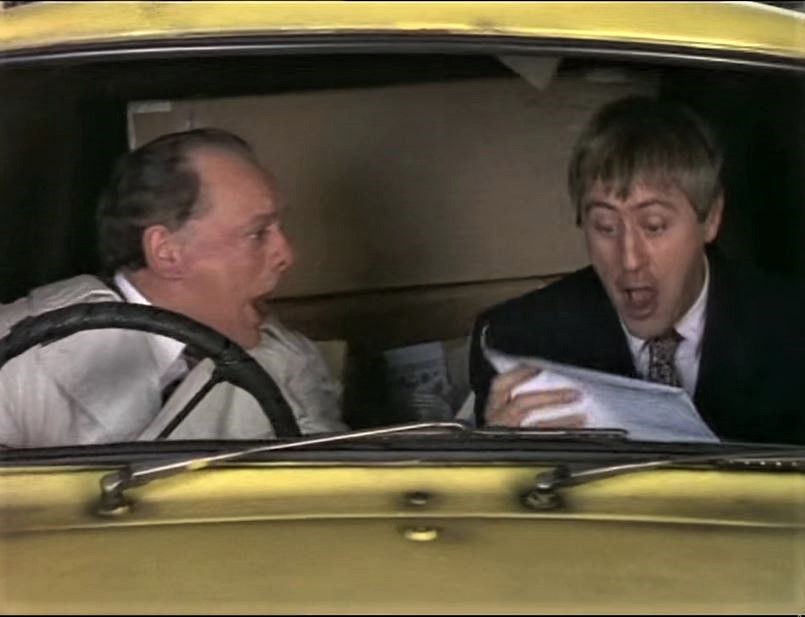
Del faints at the one-hundred-and-fifty-thousand pounds mark. Rodney faints at the four million pounds mark. Then it keeps going until it has gone for more than six million. As they sit outside afterwards, rocking the little yellow van with their excitement ('Well, we've had worst days'), suddenly their never-changing world has changed, and, for better or for worse, the sitcom can never be the same again.
This is what time can do to a sitcom. Like a genie popping out of a bottle, unless you send it straight back in as soon as possible, it'll be out and about forever and far beyond your control.
A good example of a sitcom maintaining its manipulative hold over time, like a master over a slave, is the 1962 episode of Steptoe And Son called The Bird - the first ever episode of the series proper. Harold, the restless son, is desperate to break out of the familial prison, and Albert, the father, is once again determined to keep him locked inside. On this occasion, however, an unusually smug-looking Harold thinks that he has finally found an escape route to the future.
He has found a girlfriend, Roxanne, and, he realises, if he starts dating her, and maybe eventually marries her, he can move out of the rag and bone yard, and the clock will begin ticking, and he can start really living for the very first time. He is not going to let his father in on this plan, because he knows that he will start scheming to spoil it, but he cannot help but begin teasing him:
HAROLD: I've got to get ready.
ALBERT: What have you got to get ready for?
HAROLD: I'm going out.
ALBERT: What - again?
HAROLD: Yes. Again.
ALBERT: You went out last night.
HAROLD: I know I went out last night. I'm going out again tonight an' all. I wouldn't be surprised if I don't go out again tomorrow night. All right?
ALBERT: Where are you goin' then?
HAROLD: Just out.
ALBERT: Yeah, but where?
HAROLD: Nowhere! Just out, that's all!
ALBERT: You can't go out without going anywhere!
HAROLD: Well, I can. And I'm going. Out!
ALBERT: What time will you be in?
HAROLD: Well, it depends. I might be late, I might be very late.
Once Albert has his moment of vision, however, and works out that a woman is involved, he uses his cunning to fashion a cruel finale. Bring her back home, he tells his son, bring her home to dinner, and they can put on an impressive spread: 'I'll get fish and chips, and plates, and knives and forks, proper like, and, er, gherkins, and a tin of fruit and something, and, and, evaporated milk!' Harold takes the bait, and the date is set up: dinner, at half past seven, chez moi in Oil Drum Lane.
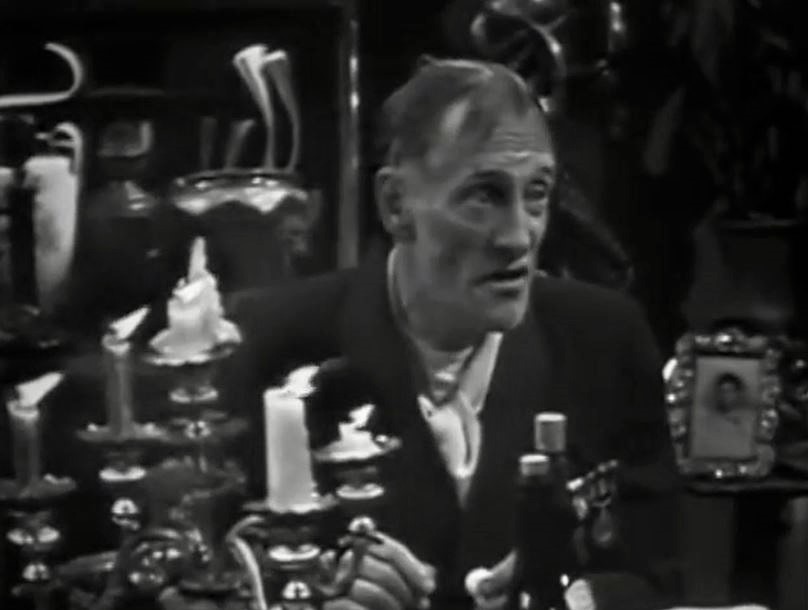
Come seven-thirty, however, and there is no sign of his girlfriend. The candles are lit, the table is laid, the fish and chips are being kept warm in the oven - but the two men are still waiting for the woman to arrive.
Harold keeps glancing anxiously at the clock, and Albert keeps pointing out what it is telling him: 'She's late, isn't she?' With each tick and each tock, the dagger slips a little deeper into his heart. 'Are you sure she's coming?' inquires Albert. 'Of course she's coming,' Harold insists as much to himself as to his father. 'All birds is late. They gotta be late. Otherwise it makes 'em look too eager an' puts the bloke off. She'll be here'.
The clock, however, has now crawled round to half past eight, the fish and chips are drying up, the candles are burning down, and still the woman has not yet arrived. 'I reckon she's given you the elbow,' says Albert. 'She ain't coming'. Harold, even after an hour of frustration, refuses to accept that as fact. 'Of course she's coming,' he snaps, pacing up and down. 'It ain't very late.'
Old Albert is now in his element. 'She ain't here, is she? I mean, if she was so keen on you, she'd be here, wouldn't she? I mean, she should be here, shouldn't she? It seems a shame, that's all. A fine fella like you. If she treats you like this now, what's it going to be like later on?'
Harold, at long last, cracks, and starts smashing up the plates and throwing the food at the walls. Just at the moment, however, that he's whipping the table with its cloth, they hear a knock at the door. 'It's her!' exclaims Albert.
Harold marches off and opens the door. 'Hello, Harold,' says the woman, brightly. 'You're a bit late, ain't yer?' replies her stone-faced boyfriend. Infuriated by her claim that she is only 'a few minutes' later than expected for dinner, he hands her a plate of dried-up fish and chips, says that he hopes she'll enjoy it, and slams the door shut in her face.
Albert is delighted. 'That's the way to treat 'em, son, I'm proud of yer!' he crows. 'We don't want no women 'ere, we're better off by ourselves!' Harold, now despondent, stares the other way, into the timeless looping gloom that is his future.
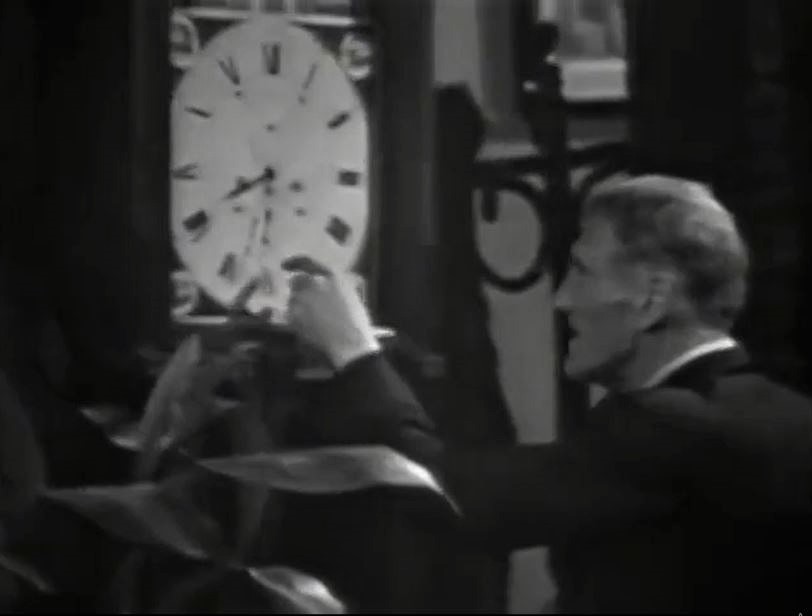
This is when the full trickery of this time piece is revealed. Once alone, his devious father, almost nonchalantly, reaches up and turns the big hand of the clock back one hour - so that it tells the time that it really is. From looking like it was going to be poor Harold's liberator, the clock is thus back to being his gaoler.
A contrasting example of the intrusion of time, where the clock is king and the characters are its helpless subjects, occurs in the 1973 Whatever Happened To The Likely Lads? episode No Hiding Place. It is almost brutal, in this particular half hour, how powerful the big and the small hands, once moving, can be as the mere mortals are able to do nothing but wait anxiously for their fate.
Normally, in spite of the wonderful wistfulness of its theme song, the sitcom's two protagonists, the upbeat Bob Ferris and the downbeat Terry Collier, occupy an empty and frozen moment in time. For their first incarnation, it was the middle of the Sixties, and now, for their return, it is somewhere in the early Seventies. Like insects trapped under a tumbler, they are set up for everyday life to feel circular and repetitive.
In No Hiding Place, however, just for one comic air-pocket of thirty minutes, the hands of the clock are allowed to start moving again. It is like a stop-watch being set off straight after the opening credits.
It is all because the plot has the England football team playing an international game in Bulgaria that afternoon, and Bob and Terry, back home, are determined that they'll avoid hearing or seeing the score before the highlights start on TV at 10:20pm. That gives them, after a leisurely lunchtime pint, about eight hours not only to dodge every radio, television, telephone and newspaper headline in the area, but also to hide from the fog-horned Flint, a mercilessly garrulous local irritant who has bet both of them a fiver that they cannot maintain a sporting radar silence throughout that length of time.
The consequence is that the clock keeps ticking from the start to the finish as the two men try desperately to control an ever-changing set of threats to their precious ignorance. There they are, racing out of the hairdressers and the pub, pausing at the WI for a lesson in flower-arranging and at the hospital to deposit a pint each of blood, then seeking sanctuary in a church, still gazing at the watch face, still mesmerised by the moving minutes:
TERRY: What time do you make it?
BOB: Er...ten past four. The game'll be over. The ground'll be empty. The crowd will have streamed away in their thousands.
TERRY: Aye, back to their communes and collective farms, plodding through the Balkan mud in their wellies.
BOB: Yep. The team will be back in their hotel. Kebab and chips. Victory champagne and a sing-song.
TERRY: Aye. Or drowning the memories of their crushing defeat in communist-owned state brown ale.
BOB: Well, six hours and then we'll know.
TERRY: Oh, I can't stay here for another six hours, man!
After narrowly missing an unsolicited news update from the mischievous Flint, who has caught up with them, they race out of the church and drive back home, averting their eyes as they go past a TV dealership and a one-legged news vendor.
'Less than ten minutes to go,' gasps Bob as they carry the cooled bottles of beer into the living room, take the phone off the hook, and settle down in front of the set. 'What a day,' groans Terry. 'It's been endless!'
That is what time can do to you when there's so much of it to live through. It is no wonder that sitcom characters are usually only subjected to the edited highlights.
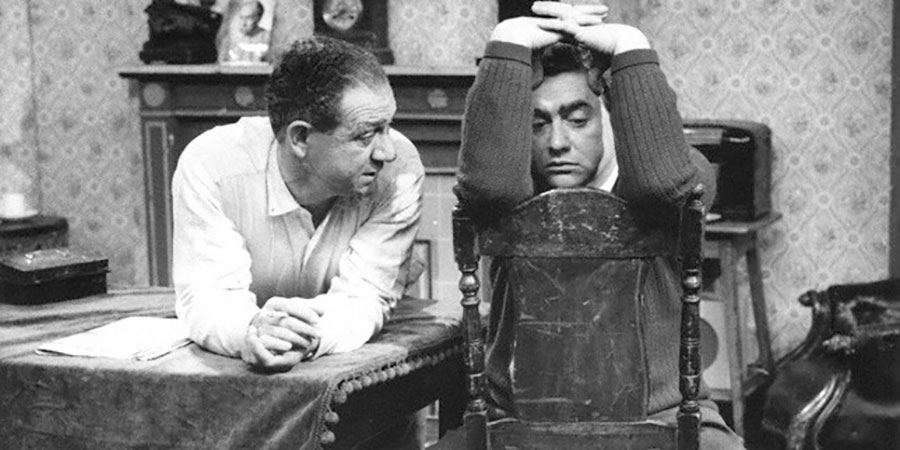
Of course, for the absolute unexpurgated exposure to the indomitable power of time, one has that audacious edition of Hancock: Sunday Afternoon At Home. The whole of this extraordinary episode is about our essential helplessness in the midst of plain old ordinary time.
Here, as Hancock and his friends sit around passive and vulnerable in the same small suburban room, on a routine Sunday, time keeps emerging into their consciousness like the shark fin slicing through the water in Jaws:
HANCOCK: Ohhh...Oh dear...Oh dear oh dear...Oh, dear me...Ohhh...Stone me, what a life!...What's the time?'
BILL: Two o'clock.
HANCOCK: Is that all?...Oh, dear oh dear...Ah, dear me...I don't know...Aaah...Oh, I'm fed up!
SID: Oi!
HANCOCK: What?
SID: Why don't you shut up moaning and let me get on with the paper?
HANCOCK: Well, I'm fed up!
SID: So you just said.
HANCOCK: Well so I am!
SID: Look: so am I, fed up; and so is Bill, fed up. We're all fed up. So shut up moaning and make the best of it!
HANCOCK: ...Ohhhh...Are you sure it's only two o'clock?
BILL: No. It's, er...one minute past two, now.
HANCOCK: One minute past two? Doesn't the time drag!
They are not entirely defenceless. They have the capacity to conjure up distractions - mulling over articles on medical matters, seeing figures and faces in the wallpaper, putting names to old tunes, gossiping about local affairs, doodling, getting bored playing board games, having a nap, peeping out at the other trapped people across the road, cracking nuts, or even enduring the next-door neighbour's bulging portfolio of farmyard impressions.
It is not, though, enough. It is never enough. Time keeps trouncing each bid to block it out.

Hancock, the inveterate dreamer, tries using clichés to shield him from time's arrows - 'That's life...It's always the same...There you are, up one minute, down the next...You never know when it's your turn next...That's the way it goes...You never know what's round the next corner, do you?...' Nothing, however, threatens to arrest the onslaught and cuff the hands of the clock.
It is Sid, that most aggressively un-blinkered of realists, who knows that they are locked for life in this Sisyphean task. 'I hate Sundays,' moans Hancock. 'So do I,' snaps Sid, 'but there's one a week, and there always has been, and there's nothing we can do about it!'
It is only long after the last crumb of the fish paste sandwiches has been swallowed, and the final 'whoop-whoop' squawk of the splay-footed moorhen has been attempted, that the clock finally starts to chime:
SID: Twelve o'clock. It's Monday at last. That must be the most miserable day I've ever spent in my life!
BILL: Me, too - we didn't play a single game!
HANCOCK: Well, it's the last day I'll ever spend like it, I tell you!
SID: We gotta get organised.
HANCOCK: Definitely! We can't go on like this, frittering away our lives like we've done today. We've got to do something constructive. Time is valuable!
SID: I agree.
BILL: So do I.
HANCOCK: We only live once.
SID: Of course we do.
HANCOCK: There's a million things we could do.
SID: Certainly there are. There are things like, er...
HANCOCK: Yes, er...
BILL: Sure, we could...
HANCOCK: We could, er...Like we...er...I'll see you next Sunday, then?
SID: Yeah.
BILL: Yeah.
HANCOCK: Goodnight.
Those dark clouds hovering between the past and the future will thus hover on. Sunday Afternoon At Home, for all of its delightfully funny moments, knows full well that, beneath that humorous façade, it is tapping into what makes any moment of time, when we pause to watch it go past, so profoundly unnerving.
It is at moments such as this one, at this stage in the year, that time goes from a backdrop to our actions to become the foreground for our reflections - the fascinating, enticing and frightening screen that shows all those things that are fading away and all of the things that are forming in front of our eyes.
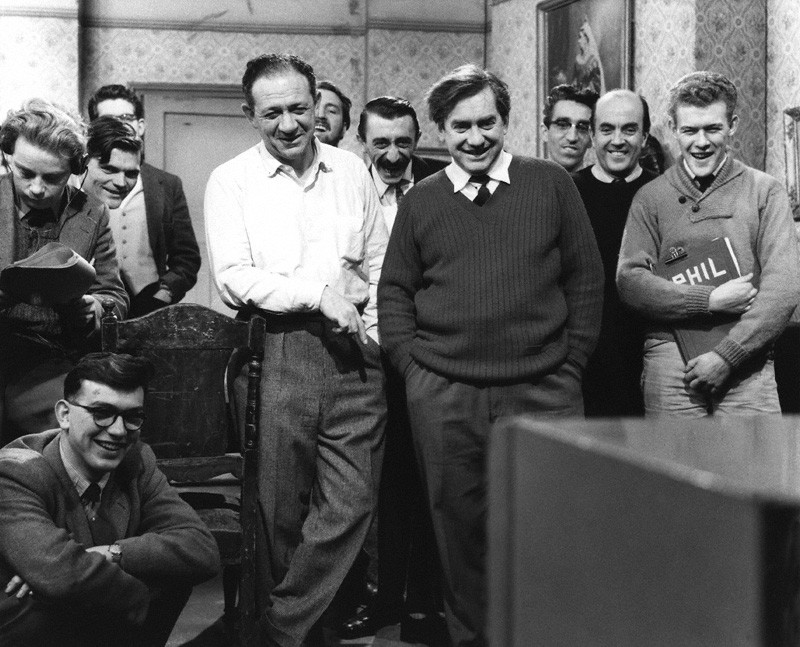
That, perhaps, is one reason why we enjoy watching, and making, sitcoms. When the clocks outside are sounding just a little too remorseless in their forward movements, and we are feeling just a little too vulnerable in the light of the consequences that they cast, there is something very comforting about the pliability and playfulness of the time that is captured in a sitcom. Like the snow in a glass globe, the writers can shake this time up whenever they wish, or stand back and let it settle.
Now, as we see out the old year and welcome in the new, remembering what, and whom, we've lost, and anticipating what surprises, good and bad, we still have to come, a sitcom, after all the commiserations and celebrations, might be a good thing to calm us back down and supply us with some comfort.
'I'll see you next Sunday, then?' Yes, please, Tony, we do hope so.
Help us publish more great content by becoming a BCG Supporter. You'll be backing our mission to champion, celebrate and promote British comedy in all its forms: past, present and future.
We understand times are tough, but if you believe in the power of laughter we'd be honoured to have you join us. Advertising doesn't cover our costs, so every single donation matters and is put to good use. Thank you.
Love comedy? Find out moreThe Likely Lads Collection

This 6 disc box set contains all 27 episodes of classic sitcom Whatever Happened To The Likely Lads?, and the 8 surviving episodes of its predecessor, The Likely Lads, including one never previously released on DVD.
Entente Cordiale
Double Date
Older Women Are More Experienced
The Suitor
The Last Of The Big Spenders
Rocker
Goodbye To All That
The Other Side Of The Fence
This classic comedy series stars Rodney Bewes and James Bolam as Geordies Terry Collier and Bob Ferris.
First released: Monday 16th October 2006
- Distributor: 2 Entertain
- Region: 2 & 4
- Discs: 6
- Minutes: 972
- Subtitles: English
- Catalogue: BBCDVD2110
![]() Buy and sell old and new items
Buy and sell old and new items
Search for this product on eBay
BCG may earn commission on sales generated through the links above.
The Complete Steptoe & Son

The classic 1960s British comedy series about a middle aged man and his elderly father who run an unsuccessful 'rag and bone' business. Harold (the son) wants to better himself but his father always seems to ruin things, sometimes accidentally and other times deliberately.
First released: Monday 29th October 2007
- Distributor: 2 Entertain
- Region: 2
- Discs: 13
- Catalogue: BBCDVD2255
![]() Buy and sell old and new items
Buy and sell old and new items
Search for this product on eBay
BCG may earn commission on sales generated through the links above.
- Released: Monday 31st October 2011
- Distributor: 2 Entertain
- Region: 2
- Discs: 13
- Catalogue: BBCDVD3570
![]() Buy and sell old and new items
Buy and sell old and new items
Search for this product on eBay
BCG may earn commission on sales generated through the links above.
The Tony Hancock Collection

This collection contains all 37 surviving episodes, from 1956 to 1961, of the classic TV sitcom written by Galton and Simpson, featuring East Cheam's most famous resident, Tony Hancock, alongside supporting stars including Sid James and Kenneth Williams.
Sadly, 17 episodes from the series are missing believed wiped, but their scripts are included in PDF form amongst the set's extras.
First released: Monday 22nd October 2007
- Distributor: 2 Entertain
- Region: 2
- Discs: 8
- Minutes: 1,083
- Subtitles: English
- Catalogue: BBCDVD2168
![]() Buy and sell old and new items
Buy and sell old and new items
Search for this product on eBay
BCG may earn commission on sales generated through the links above.
Dad's Army - The Complete Collection

Captain Mainwaring, Sergeant Wilson, Corporal Jones and Privates Pike, Godfrey, Walker and Frazer are back in this complete series boxset - enjoy the endeavours and hilarious antics of the Walmington-On-Sea Home Guard!
This box set contains the complete series: One, Three, Four, Five, Six, Seven, Eight, Nine, The Christmas Specials and all 3 surviving episodes of Series 2, plus a great selection of extras including the radio adaptations of the 3 Series 2 missing episodes.
First released: Monday 29th October 2007
- Distributor: 2 Entertain
- Region: 2
- Discs: 14
- Catalogue: BBCDVD2254
![]() Buy and sell old and new items
Buy and sell old and new items
Search for this product on eBay
BCG may earn commission on sales generated through the links above.

